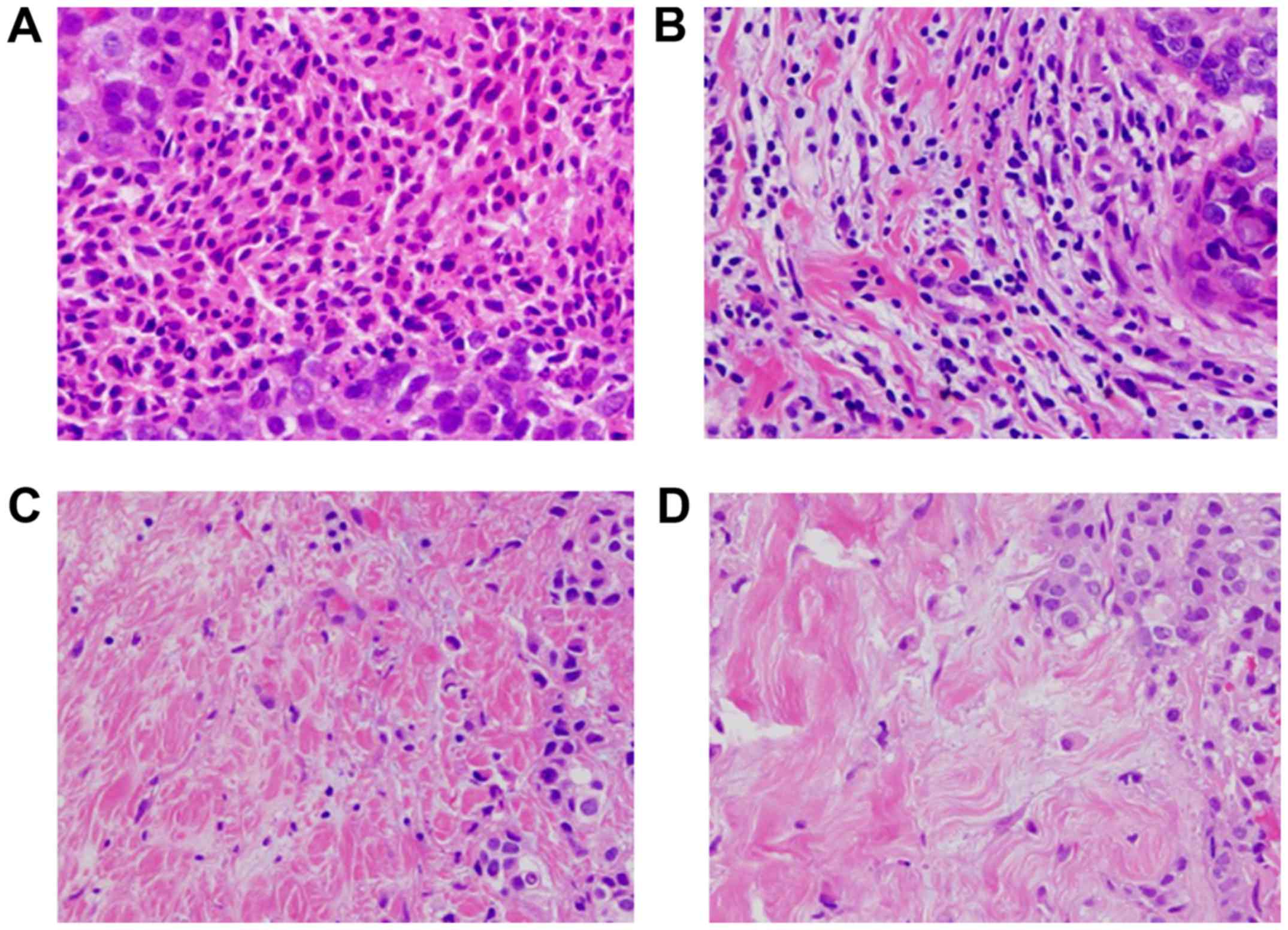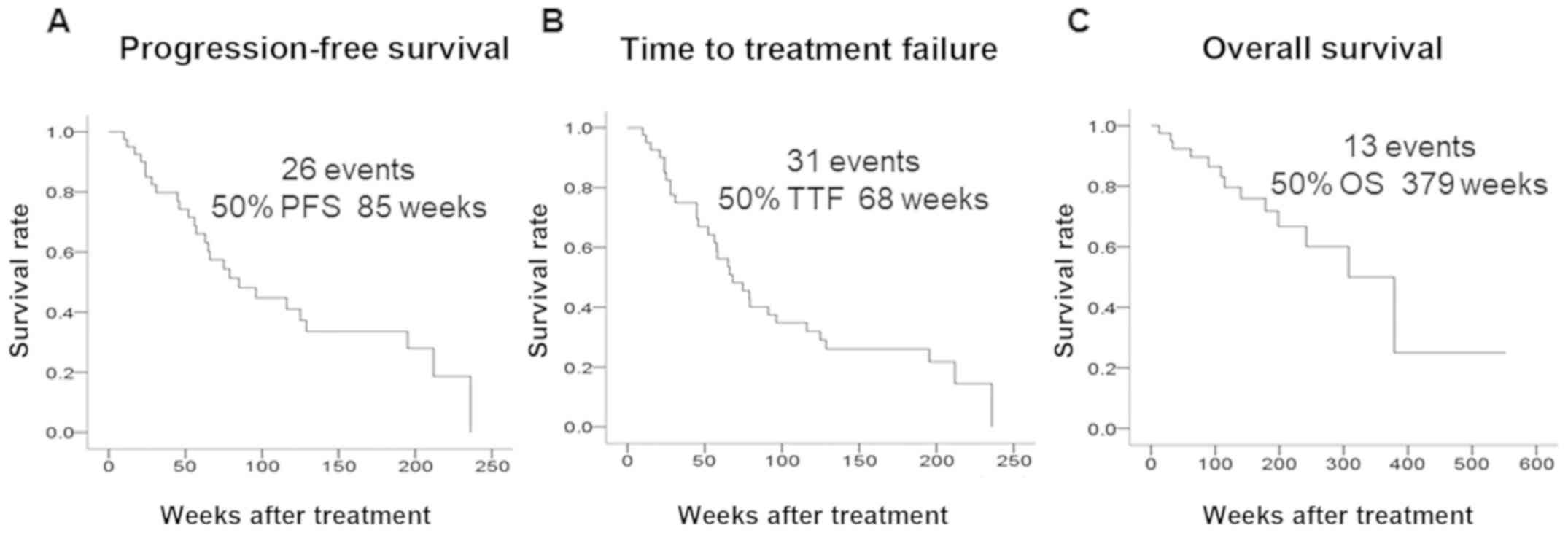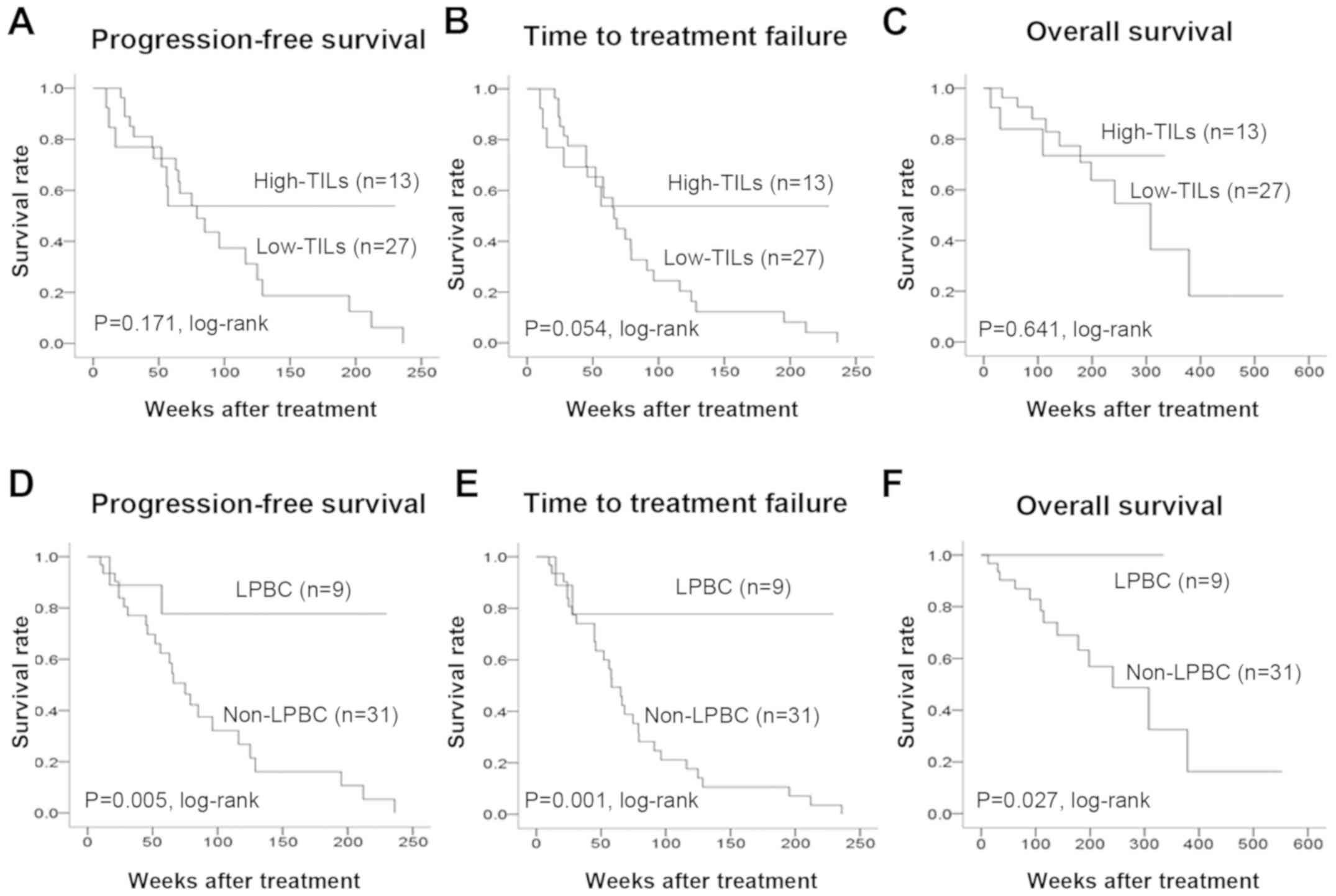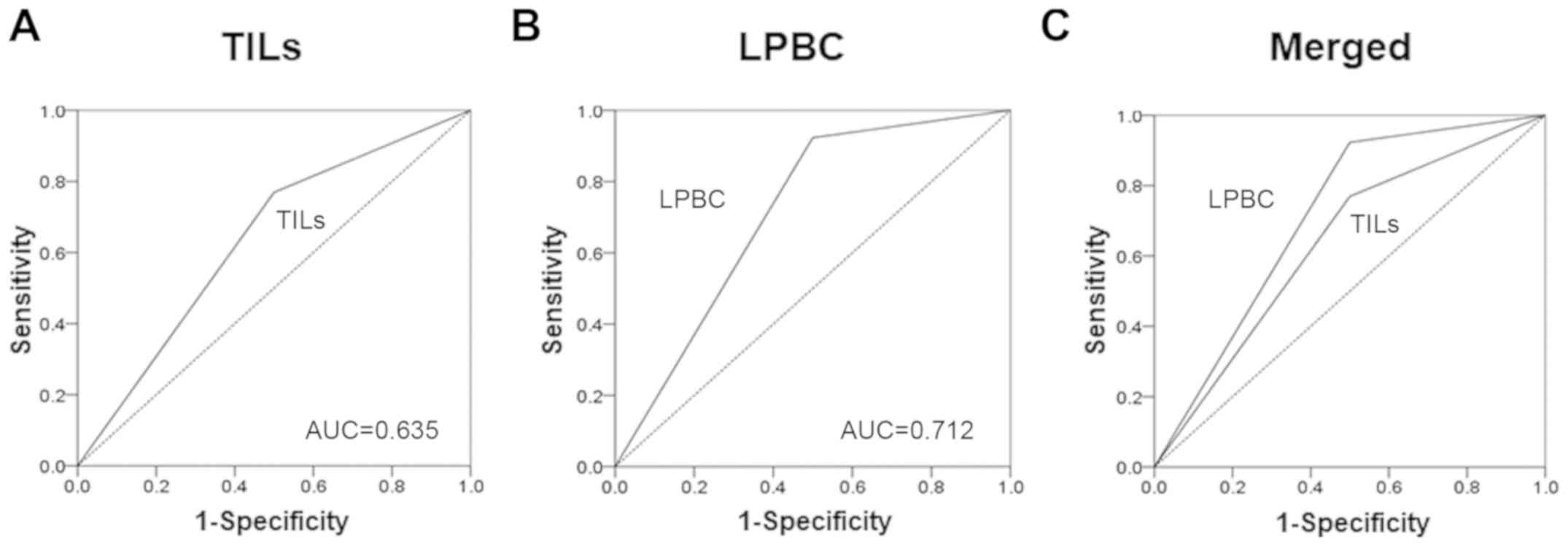|
1
|
Andre F, Slimane K, Bachelot T, Dunant A,
Namer M, Barrelier A, Kabbaj O, Spano JP, Marsiglia H, Rouzier R,
et al: Breast cancer with synchronous metastases: Trends in
survival during a 14-year period. J Clin Oncol. 22:3302–3308.
2004.PubMed/NCBI View Article : Google Scholar
|
|
2
|
Hortobagyi GN: Treatment of breast cancer.
N Engl J Med. 339:974–984. 1998.PubMed/NCBI View Article : Google Scholar
|
|
3
|
Ellis MJ, Tao Y, Luo J, A'Hern R, Evans
DB, Bhatnagar AS, Chaudri Ross HA, von Kameke A, Miller WR, Smith
I, et al: Outcome prediction for estrogen receptor-positive breast
cancer based on postneoadjuvant endocrine therapy tumor
characteristics. J Natl Cancer Inst. 100:1380–1388. 2008.PubMed/NCBI View Article : Google Scholar
|
|
4
|
Ellis MJ, Suman VJ, Hoog J, Lin L, Snider
J, Prat A, Parker JS, Luo J, DeSchryver K, Allred DC, et al:
Randomized phase II neoadjuvant comparison between letrozole,
anastrozole, and exemestane for postmenopausal women with estrogen
receptor-rich stage 2 to 3 breast cancer: Clinical and biomarker
outcomes and predictive value of the baseline PAM50-based intrinsic
subtype-ACOSOG Z1031. J Clin Oncol. 29:2342–2349. 2011.PubMed/NCBI View Article : Google Scholar
|
|
5
|
Hanahan D and Weinberg RA: Hallmarks of
cancer: The next generation. Cell. 144:646–674. 2011.PubMed/NCBI View Article : Google Scholar
|
|
6
|
Zitvogel L, Kepp O and Kroemer G: Immune
parameters affecting the efficacy of chemotherapeutic regimens. Nat
Rev Clin Oncol. 8:151–160. 2011.PubMed/NCBI View Article : Google Scholar
|
|
7
|
Dougan M and Dranoff G: Immune therapy for
cancer. Annu Rev Immunol. 27:83–117. 2009.PubMed/NCBI View Article : Google Scholar
|
|
8
|
Adams S, Gray RJ, Demaria S, Goldstein L,
Perez EA, Shulman LN, Martino S, Wang M, Jones VE, Saphner TJ, et
al: Prognostic value of tumor-infiltrating lymphocytes in
triple-negative breast cancers from two phase III randomized
adjuvant breast cancer trials: ECOG 2197 and ECOG 1199. J Clin
Oncol. 32:2959–2966. 2014.PubMed/NCBI View Article : Google Scholar
|
|
9
|
Denkert C, von Minckwitz G, Brase JC, Sinn
BV, Gade S, Kronenwett R, Pfitzner BM, Salat C, Loi S, Schmitt WD,
et al: Tumor-infiltrating lymphocytes and response to neoadjuvant
chemotherapy with or without carboplatin in human epidermal growth
factor receptor 2-positive and triple-negative primary breast
cancers. J Clin Oncol. 33:983–991. 2015.PubMed/NCBI View Article : Google Scholar
|
|
10
|
Savas P, Salgado R, Denkert C, Sotiriou C,
Darcy PK, Smyth MJ and Loi S: Clinical relevance of host immunity
in breast cancer: From TILs to the clinic. Nat Rev Clin Oncol.
13:228–241. 2016.PubMed/NCBI View Article : Google Scholar
|
|
11
|
Asano Y, Kashiwagi S, Goto W, Kurata K,
Noda S, Takashima T, Onoda N, Tanaka S, Ohsawa M and Hirakawa K:
Tumour-infiltrating CD8 to FOXP3 lymphocyte ratio in predicting
treatment responses to neoadjuvant chemotherapy of aggressive
breast cancer. Br J Surg. 103:845–854. 2016.PubMed/NCBI View Article : Google Scholar
|
|
12
|
Asano Y, Kashiwagi S, Onoda N, Kurata K,
Morisaki T, Noda S, Takashima T, Ohsawa M, Kitagawa S and Hirakawa
K: Clinical verification of sensitivity to preoperative
chemotherapy in cases of androgen receptor-expressing positive
breast cancer. Br J Cancer. 114:14–20. 2016.PubMed/NCBI View Article : Google Scholar
|
|
13
|
Asano Y, Kashiwagi S, Onoda N, Noda S,
Kawajiri H, Takashima T, Ohsawa M, Kitagawa S and Hirakawa K:
Predictive value of neutrophil/lymphocyte ratio for efficacy of
preoperative chemotherapy in triple-negative breast cancer. Ann
Surg Oncol. 23:1104–1110. 2016.PubMed/NCBI View Article : Google Scholar
|
|
14
|
Asano Y, Kashiwagi S, Onoda N, Noda S,
Kawajiri H, Takashima T, Ohsawa M, Kitagawa S and Hirakawa K:
Platelet-lymphocyte ratio as a useful predictor of the therapeutic
effect of neoadjuvant chemotherapy in breast cancer. PLoS One.
11(e0153459)2016.PubMed/NCBI View Article : Google Scholar
|
|
15
|
Greene FL and Sobin LH: A worldwide
approach to the TNM staging system: Collaborative efforts of the
AJCC and UICC. J Surg Oncol. 99:269–272. 2009.PubMed/NCBI View Article : Google Scholar
|
|
16
|
Goldhirsch A, Wood WC, Coates AS, Gelber
RD, Thürlimann B and Senn HJ: Panel members. Strategies for
subtypes-dealing with the diversity of breast cancer: Highlights of
the St. Gallen International Expert Consensus on the Primary
Therapy of Early Breast Cancer 2011. Ann Oncol. 22:1736–1747.
2011.PubMed/NCBI View Article : Google Scholar
|
|
17
|
Eisenhauer EA, Therasse P, Bogaerts J,
Schwartz LH, Sargent D, Ford R, Dancey J, Arbuck S, Gwyther S,
Mooney M, et al: New response evaluation criteria in solid tumours:
Revised RECIST guideline (version 1.1). Eur J Cancer. 45:228–247.
2009.PubMed/NCBI View Article : Google Scholar
|
|
18
|
Salgado R, Denkert C, Demaria S, Sirtaine
N, Klauschen F, Pruneri G, Wienert S, Van den Eynden G, Baehner FL,
Penault-Llorca F, et al: The evaluation of tumor-infiltrating
lymphocytes (TILs) in breast cancer: Recommendations by an
International TILs Working Group 2014. Ann Oncol. 26:259–271.
2015.PubMed/NCBI View Article : Google Scholar
|
|
19
|
Ono M, Tsuda H, Shimizu C, Yamamoto S,
Shibata T, Yamamoto H, Hirata T, Yonemori K, Ando M, Tamura K, et
al: Tumor-infiltrating lymphocytes are correlated with response to
neoadjuvant chemotherapy in triple-negative breast cancer. Breast
Cancer Res Treat. 132:793–805. 2012.PubMed/NCBI View Article : Google Scholar
|
|
20
|
Mao Y, Qu Q, Zhang Y, Liu J, Chen X and
Shen K: The value of tumor infiltrating lymphocytes (TILs) for
predicting response to neoadjuvant chemotherapy in breast cancer: A
systematic review and meta-analysis. PLoS One.
9(e115103)2014.PubMed/NCBI View Article : Google Scholar
|
|
21
|
Loi S: Host antitumor immunity plays a
role in the survival of patients with newly diagnosed
triple-negative breast cancer. J Clin Oncol. 32:2935–2937.
2014.PubMed/NCBI View Article : Google Scholar
|
|
22
|
McShane LM, Altman DG, Sauerbrei W, Taube
SE, Gion M and Clark GM: Statistics Subcommittee of the NCI-EORTC
Working Group on Cancer Diagnostics. Reporting recommendations for
tumor marker prognostic studies. J Clin Oncol. 23:9067–9072.
2005.PubMed/NCBI View Article : Google Scholar
|
|
23
|
Couzin-Frankel J: Breakthrough of the year
2013. Cancer immunotherapy. Science. 342:1432–1433. 2013.PubMed/NCBI View Article : Google Scholar
|
|
24
|
Fridman WH, Pages F, Sautes-Fridman C and
Galon J: The immune contexture in human tumours: Impact on clinical
outcome. Nat Rev Cancer. 12:298–306. 2012.PubMed/NCBI View
Article : Google Scholar
|
|
25
|
Liu H, Zhang T, Ye J, Li H, Huang J, Li X,
Wu B, Huang X and Hou J: Tumor-infiltrating lymphocytes predict
response to chemotherapy in patients with advance non-small cell
lung cancer. Cancer Immunol Immunother. 61:1849–1856.
2012.PubMed/NCBI View Article : Google Scholar
|
|
26
|
Kocián P, Šedivcová M, Drgáč J, Cerná K,
Hoch J, Kodet R, Bartůňková J, Špíšek R and Fialová A:
Tumor-infiltrating lymphocytes and dendritic cells in human
colorectal cancer: Their relationship to KRAS mutational status and
disease recurrence. Hum Immunol. 72:1022–1028. 2011.PubMed/NCBI View Article : Google Scholar
|
|
27
|
Lee WS, Kang M, Baek JH, Lee JI and Ha SY:
Clinical impact of tumor-infiltrating lymphocytes for survival in
curatively resected stage IV colon cancer with isolated liver or
lung metastasis. Ann Surg Oncol. 20:697–702. 2013.PubMed/NCBI View Article : Google Scholar
|
|
28
|
Omoto Y, Eguchi H, Yamamoto-Yamaguchi Y
and Hayashi S: Estrogen receptor (ER) beta1 and ERbetacx/beta2
inhibit ERalpha function differently in breast cancer cell line
MCF7. Oncogene. 22:5011–5020. 2003.PubMed/NCBI View Article : Google Scholar
|
|
29
|
Kroemer G, Galluzzi L, Kepp O and Zitvogel
L: Immunogenic cell death in cancer therapy. Annu Rev Immunol.
31:51–72. 2013.PubMed/NCBI View Article : Google Scholar
|
|
30
|
Tesniere A, Panaretakis T, Kepp O, Apetoh
L, Ghiringhelli F, Zitvogel L and Kroemer G: Molecular
characteristics of immunogenic cancer cell death. Cell Death
Differ. 15:3–12. 2008.PubMed/NCBI View Article : Google Scholar
|
|
31
|
Kono K, Mimura K and Kiessling R:
Immunogenic tumor cell death induced by chemoradiotherapy:
Molecular mechanisms and a clinical translation. Cell Death Dis.
4(e688)2013.PubMed/NCBI View Article : Google Scholar
|
|
32
|
Yamazaki T, Hannani D, Poirier-Colame V,
Ladoire S, Locher C, Sistigu A, Prada N, Adjemian S, Catani JP,
Freudenberg M, et al: Defective immunogenic cell death of
HMGB1-deficient tumors: Compensatory therapy with TLR4 agonists.
Cell Death Differ. 21:69–78. 2014.PubMed/NCBI View Article : Google Scholar
|
|
33
|
Cataliotti L, Buzdar AU, Noguchi S, Bines
J, Takatsuka Y, Petrakova K, Dube P and de Oliveira CT: Comparison
of anastrozole versus tamoxifen as preoperative therapy in
postmenopausal women with hormone receptor-positive breast cancer:
The Pre-Operative ‘Arimidex’ Compared to Tamoxifen (PROACT) trial.
Cancer. 106:2095–2103. 2006.PubMed/NCBI View Article : Google Scholar
|


















